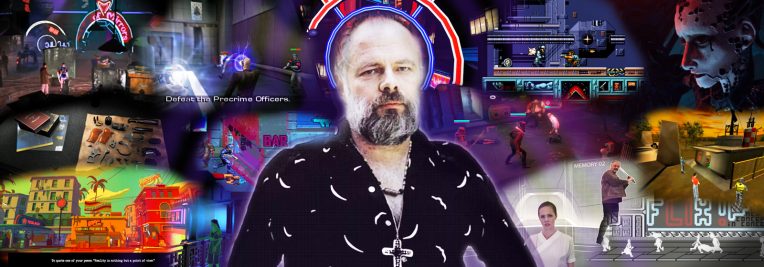How many video games are based on the works of Philip K. Dick? Surprisingly, the answer wasn’t readily available – so with this post I’ve put together a complete list of all the direct adaptations of his work.
Long-term readers will know that I have been heavily influenced by the works of Philip K. Dick (PKD). His works break through the illusory constructs of our socioeconomic, technological and personal worlds. They deconstruct concepts of power, wealth, destiny, hedonism and so many of the other structures that bind us into a fixed perspective of what it means to be human.
He reminds us that our creative capacity is infinite and our ability to overcome all oppressors is absolute; but also that those in power will use everything they have, including the manipulation of reality itself, to work against our potential for liberation.
Even more importantly, perhaps, he does all this while uplifting the so-called ‘normal citizen’ to a point of paradigm shifting significance. PKD saw this as a consistent and key component of his work, even going so far to call it part of his formula when he stated that his protagonists are: “small but not nonexistent…little as he is [he] has a right to live to fulfil his human existence”.
There’s been a lot of discussion about the heavy influence that PKD has had on science fiction as a genre, both in film and written form, with dozens of his works adapted into movies and TV shows, comic books and unofficial sequel novels. However, there has been relatively little attention given to his work in the world of videogames and the majority of examples that we have are from a single book (Do Androids Dream of Electric Sheep).
Perhaps this is because so much of PKD’s library is about the abstract worlds of interpersonal relationships and the existential crises of both individuals and social structures. Whatever the reason, it’s an interesting gap in his ongoing legacy. Indeed, most of the games we do see emerge are linked closely to film adaptations of his work – some of them little more than promotional materials (e.g. the Blade Runner 2049 games).
Interestingly, there has been a resurgence of PKD-inspired games with the release of new consumer VR technology. Although these games do not really take full advantage of the reality-bending potential of VR, it’s clear that the medium is exceptionally well-suited to the works of PKD. Unfortunately, many of these VR games aren’t compatible with all headsets – but they showcase a fantastic new realm of adaptations.
I’ve purposefully not included any games that are influenced by Philip K. Dick, rather than direct adaptations, as that would end up being a huge list (from the Deus Ex series, to the Stanley Parable, Prey and SOMA etc.) as his work is so iconic and influential in science fiction as a genre itself.
After each game I’ve given it a recommendation (or not) and then also a ‘PKD rating’ to score how faithful it is to the original source material.
Note: the PKD rating is not a score of the game itself, but rather how close an adaptation it is of the original source material.
So down the chronological rabbit-hole we go! Which reality you end up in only VALIS knows…
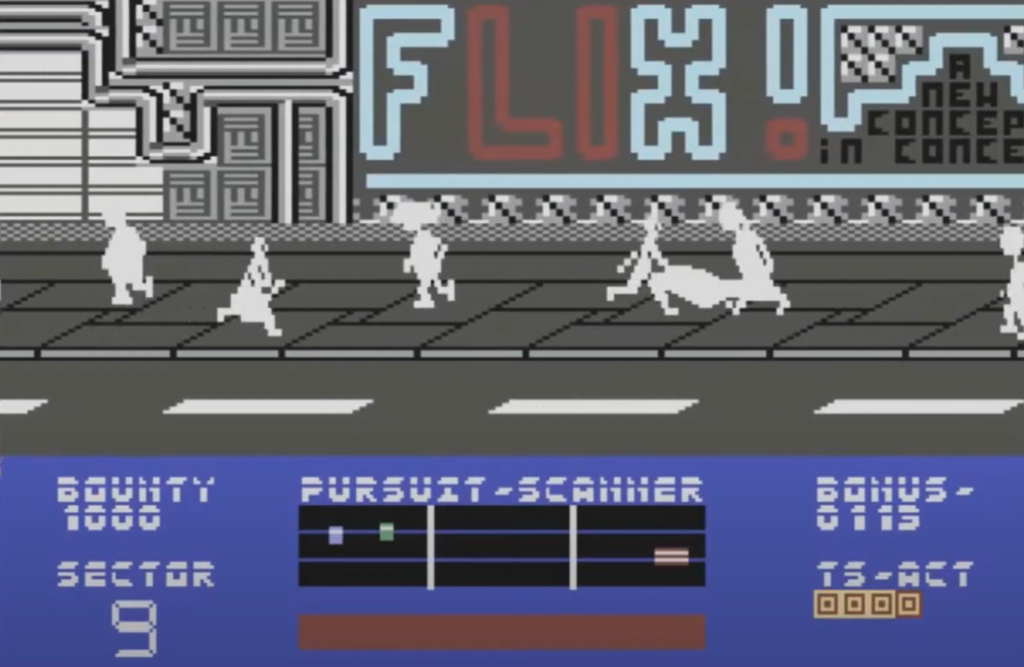
Blade Runner (1985, Commodore 64 / ZX Spectrum / Amstrad CPC)
The earliest videogame based on his work coincides with the earliest film adaptation (which is actually the second adaptation, the first being a 1962 TV episode of Out of this World based on his short story Imposter). The ZX Spectrum port really suffers from the shortcomings of that platform, but the Commodore 64 has a great chiptune soundtrack and graphics that can be readily distinguished as an adaptation of the 1982 Blade Runner film (based on the PKD novel Do Androids Dream of Electric Sheep).
Curiously, due to the wonderful world of licensing, the original game cover states that it is ‘a videogame interpretation of the film score by Vangelis’. So we have an adaptation of a soundtrack to an adaptation of the original book. Unfortunately, the gameplay doesn’t excel here as it’s both repetitive and uninteresting; plus there’s nothing really to link it back to the original source material. However, as a PKD curiosity and the earliest adaptation in videogaming, I do think it’s still worth tracking down a copy for any serious fans.
Avoid
PKD Rating: 2/10
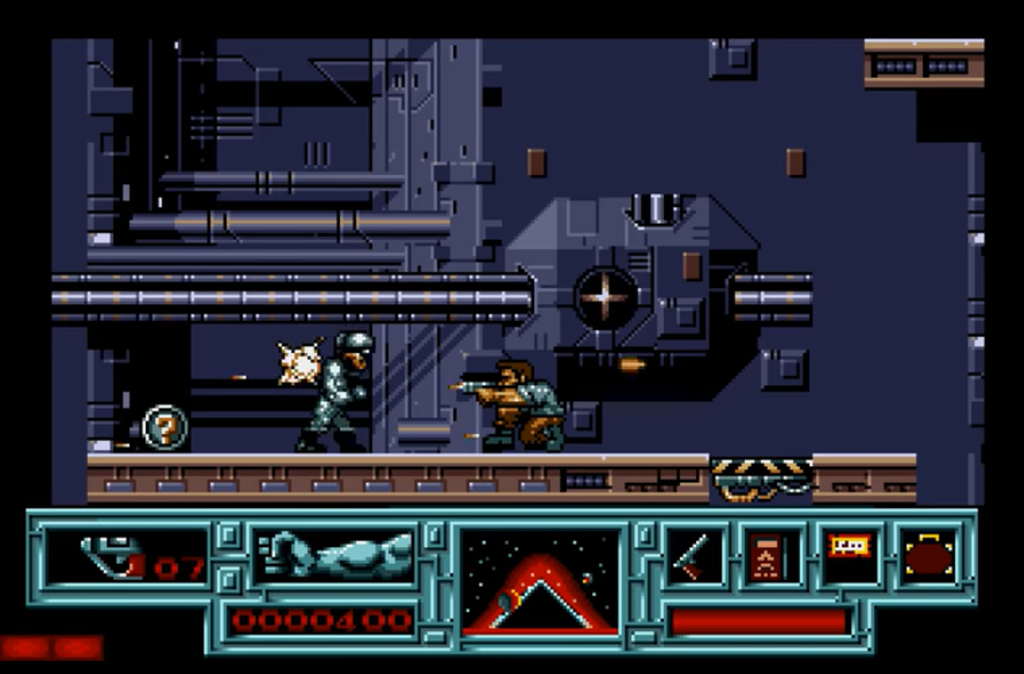
Total Recall (1990, Amiga / C64 / ZX Spectrum)
The film-licensed games that were developed by Ocean Software to coincide with the popular Arnold Schwarzenegger movie (based on the PKD short-story We Can Remember it for you Wholesale) were received with mixed reviews at the time they were released. Published on multiple platforms ranging from the NES (see below) to the Commodore Amiga, the game has a strangely stilted action-platformer vibe that was a kind of signature style for Ocean at the time.
I remember owning and having fun with this on the Amiga when it was released. The graphics and music were impressive and the movie was all the rage (particularly with younger audiences given the gratuitous violence and nudity), but the game really doesn’t hold up well today. Unfortunately, there’s just not much gameplay variation and the level designs are bland and repetitive. The more arcade-style driving sequences in between levels are still enjoyable, and help provide more a sense of being on Mars, but are still incredibly basic by today’s standards.
As far as a PKD rating is concerned, it gets some points for at least including the general premise and Mars-centred focal point of the original story; but again, this is a movie adaptation so is a few steps removed with all the subsequent ironing out that happens. There’s nothing really in the gameplay or level aesthetics that speaks strongly to the world’s that PKD created.
Average
PKD Rating: 4/10
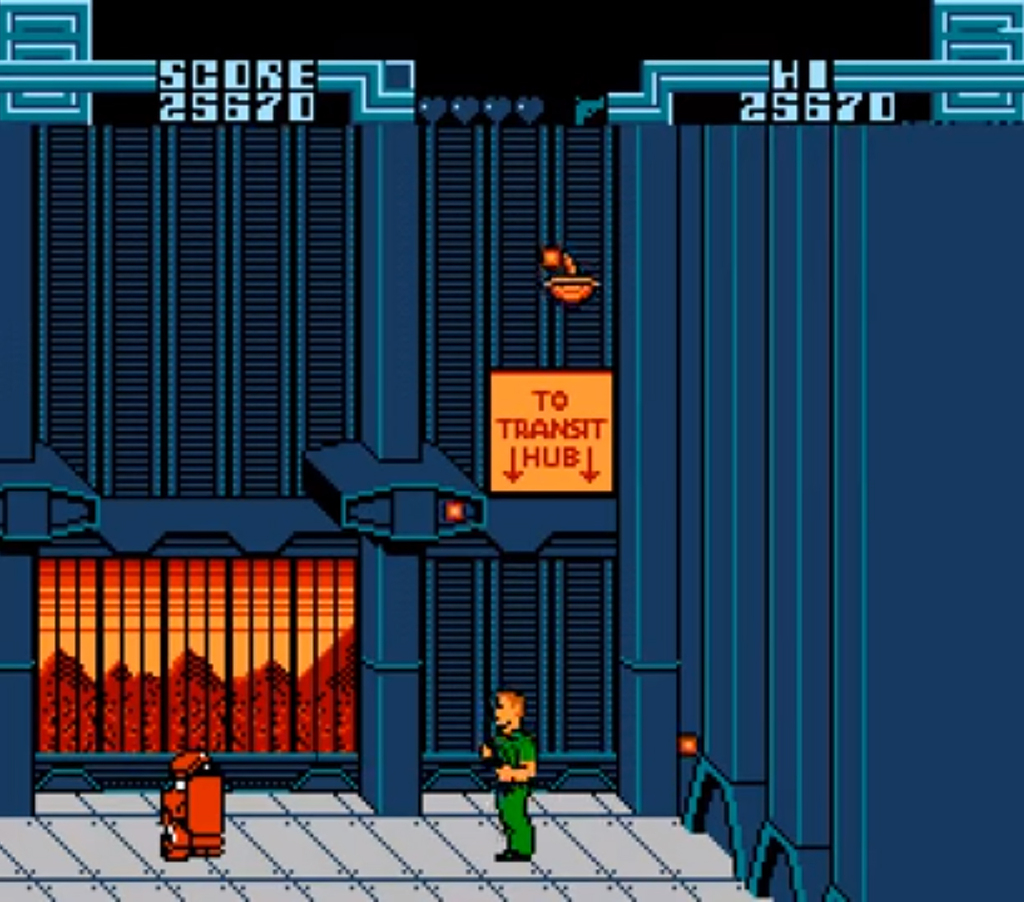
Total Recall (1990, NES)
Released alongside the other platforms above, the NES version of Ocean’s Total Recall game was a different and more agile platformer. Typical of the style of NES games based on license properties at the time, it takes some of the general themes and locations from the film and presents an average and relatively short experience.
In some ways, this version is better than its other counterparts – if only because the gameplay is a bit less stilted. However, it doesn’t feel as unique (or as Ocean) a game as the other versions that were available at the time. The graphics are also considerably different and less iconic, particularly looking back on it now.
Like the other versions, there’s little here to link it to the original story other than the general premise and some levels set on Mars. The NES version is even further removed as it includes the strange trope at the time of having random enemy types (cats?) thrown at you.
Average
PKD Rating: 3/10
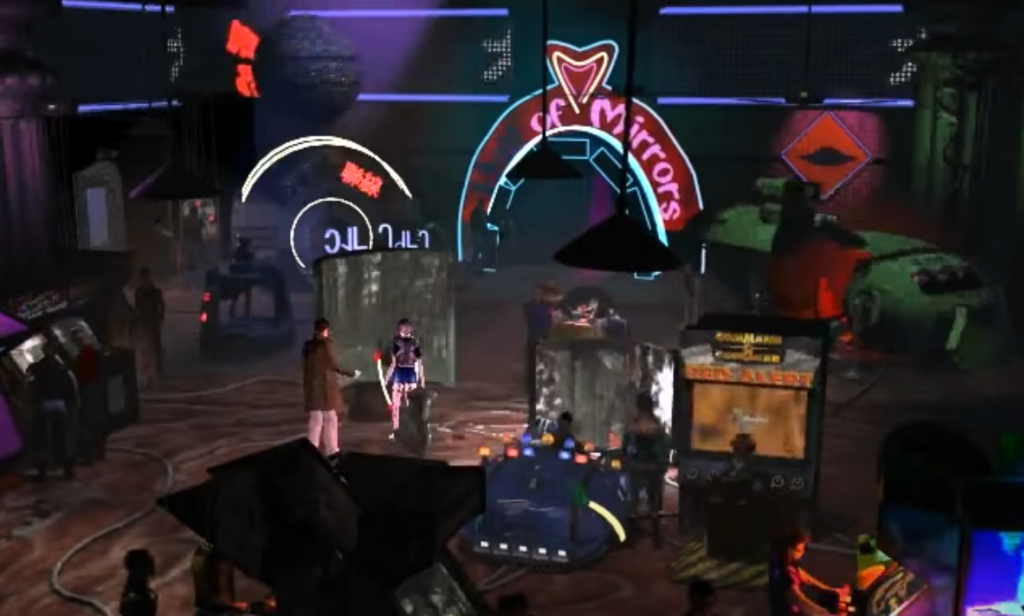
Blade Runner (1997, PC)
Both the most recognised and by far the best game included on this list, the 1997 adventure game for PC set in the Blade Runner universe is a videogame masterpiece deserving of PKD’s name. It matches the aesthetic of the film perfectly (and yes… it rains a lot), with branching narrative and conversations that at times feel like they could have been written by PKD himself. The graininess of the older graphics helps to enhance the overall gritty, industrial feel and the puzzles are both interesting and fit the narrative well.
Given that this is an extension of the universe created by PKD, rather than a direct adaptation, we have to consider how believable it is as a kind of ‘in canon’ addition to his work. In that sense this game excels at least as well as the original Blade Runner movie does itself at adapting Do Androids Dream of Electric Sheep, which we know PKD was a fan of at the conceptual stages even though he unfortunately didn’t get to see the final result himself. In the world of gaming, there’s nothing closer to the vision of Philip K Dick than the 1997 Blade Runner adventure game.
Essential
PKD Rating: 9/10
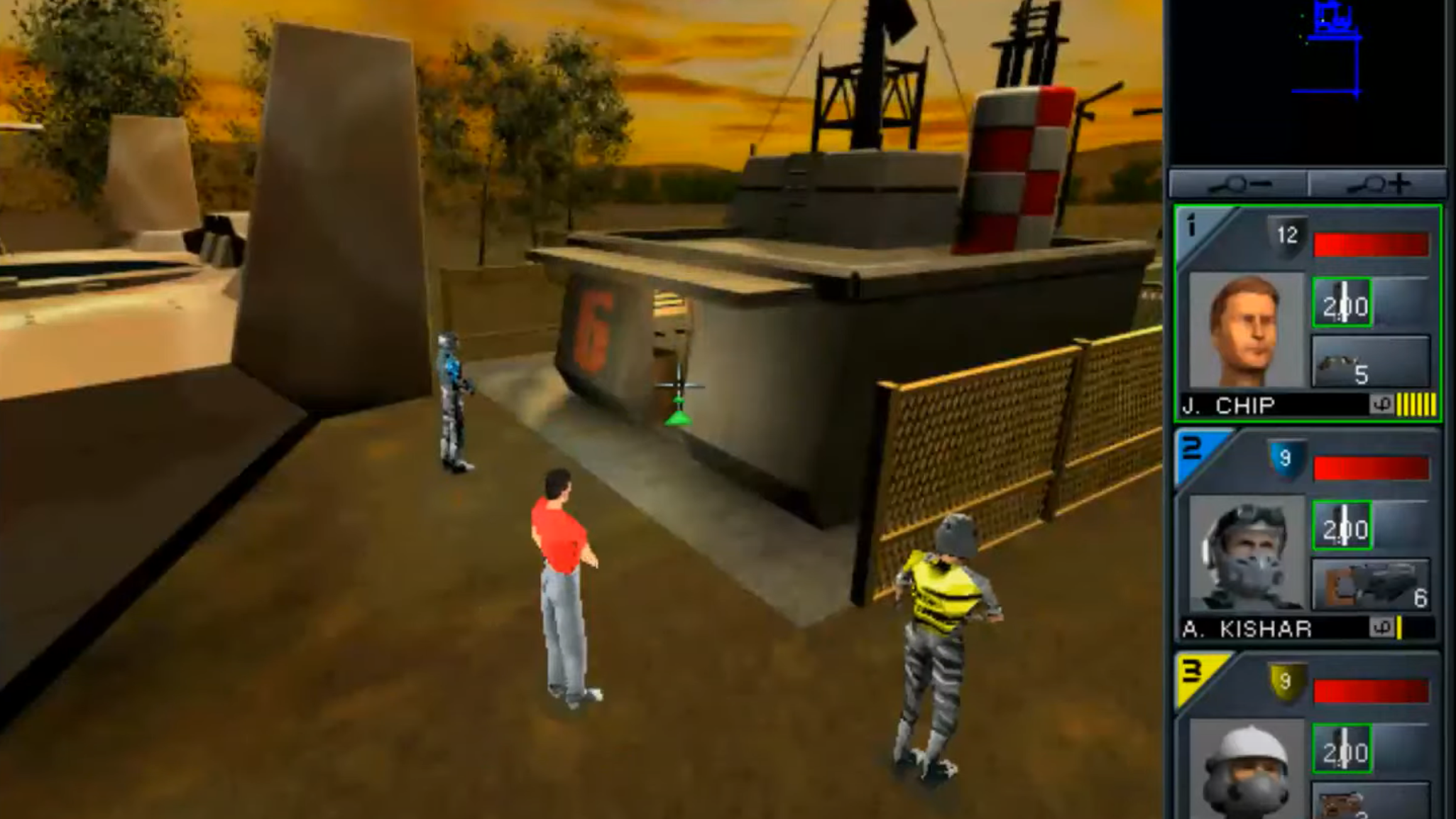
Ubik (1998, PC / PS1)
There aren’t many games out there that start with a PKD novel and work from there, so Ubik is a welcome addition to the list. Playing as a kind of action-strategy game with basic adventure elements; the gameplay feels like a dystopian 3D version of a Jagged Alliance game, but without as much complexity. The PS1 version is particularly poor (although somewhat uncommon and valuable these days), so try the PC version if you want to experience it. Early 3D games almost always suffer from the test of time and the experience is a clunky and relatively ugly one, but it does stand on its own terms as a unique example of a PKD videogame adaptation and has some interesting gameplay ideas in there.
The developers have tried to work from the original text, so the PKD rating builds from there, but the genre of gameplay itself causes the themes and scenes of the book to be substantially diluted. They do a good job of incorporating the paranoid sense of dystopian corporate espionage and some of the time-shifting madness that makes the book so unique and memorable; and get some of the reality-bending/psychic themes in there with combat abilities (acting similar to D&D spells). There’s also some interesting cut scenes that make the whole thing feel pretty authentic as far as PKD videogame adaptations go. Finally, if you’re interested in hearing more about the development of the game, there was a short behind the scenes video done at the time.
Average
PKD Rating: 7/10
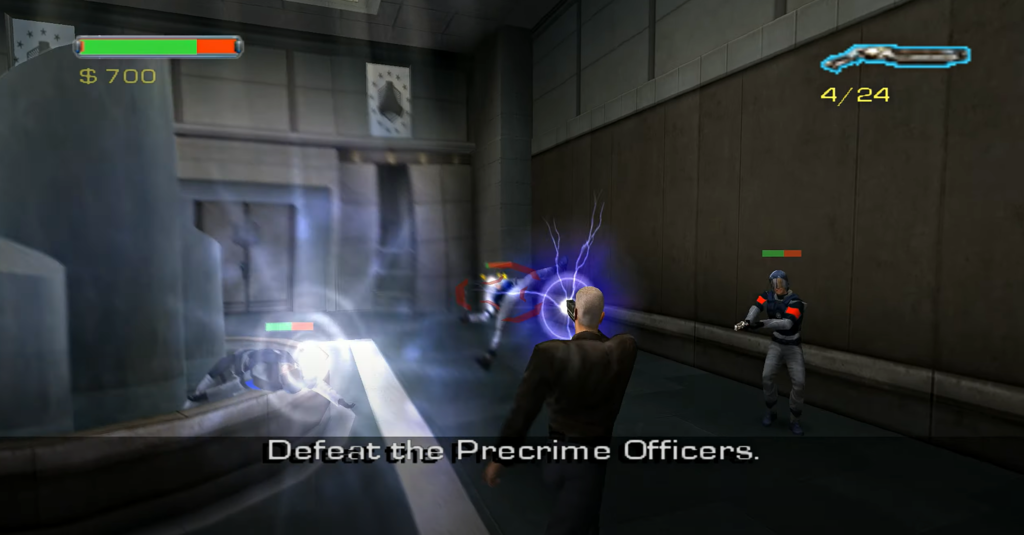
Minority Report: Everybody Runs (2002, Playstation 2 / XBox)
Based off the Steven Spielberg adaptation of PKD’s novella of the same name, this game is a sub-par 3D beat-em up that has a lot of the thematic flair and concept design of the movies but unfortunately falls short on the gameplay front.
With mostly linear level design, combined with clunky fighting and weapon mechanics, the game quickly becomes repetitive and an effort to get through. There’s little in the way of character progression, along with bland enemy designs and uninspiring boss fights to cap things off. Aside from one or two interesting level sections, and a few tense moments fighting robot police, there’s nothing here really to hold your attention for too long.
As far as adherence to the source material, this is solely contained within a few cutscenes and ultimately limited to references about precogs and precrime without much else to tie it back to PKD’s original work. Although it could have been promising, unfortunately this is one to avoid for PKD fans on all fronts.
Avoid
PKD rating: 3/10
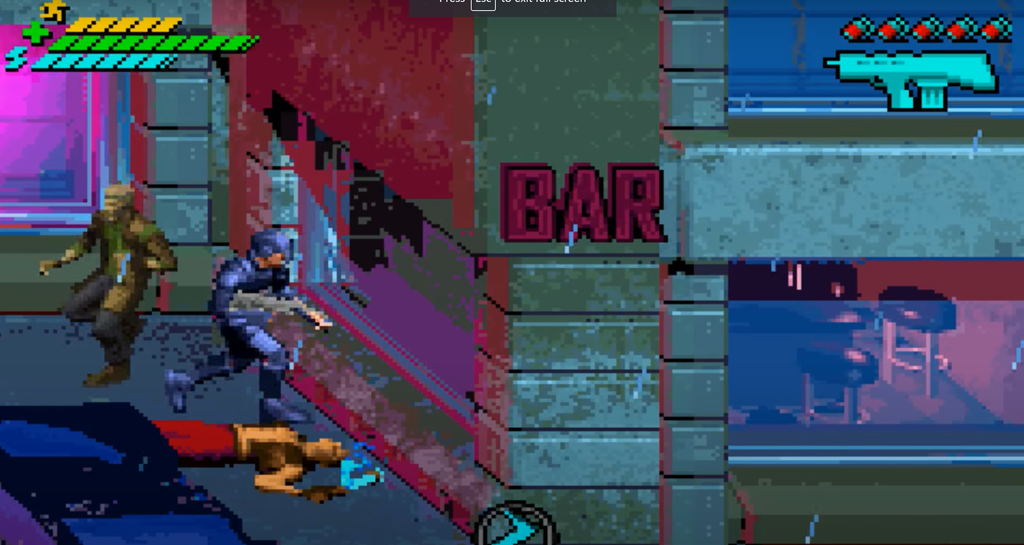
Minority Report: Everybody Runs (2002, Gameboy Advanced)
As is often the case with portable versions of games in early console generations, the Gameboy Advanced version of Minority Report: Everybody Runs is an entirely different game to the PS2/Xbox release above.
Although keeping to the beat-em up genre, the 2D-isometric aesthetic is more colourful and interesting than its console counterparts and looks great for the GBA. There is also some nice (though repetitive) music, but unfortunately that’s about where the good things in this game end. The gameplay is sloppy and becomes boring quickly, with nothing much to the game beyond the initial impression you get of it.
Although I prefer this GBA version of the game to the console ones, mainly because of the colourful environments, it scores equally poorly on the PKD rating as there’s little here beyond a few still images and keywords to tie back to the Minority Report story.
Avoid
PKD rating: 3/10
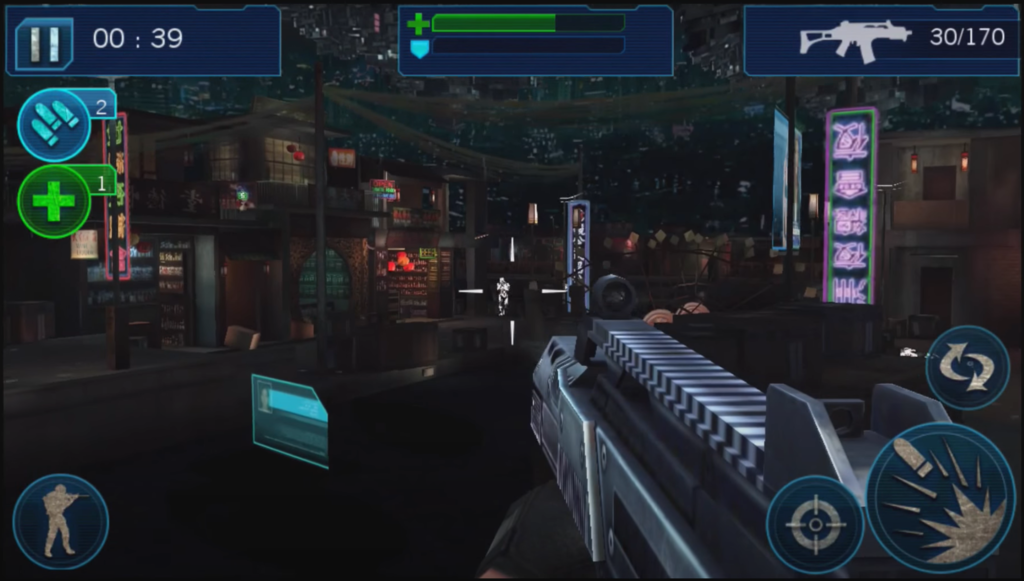
Total Recall (2012, iOS / Android)
I’ve never really understood why developers try to put FPS games onto iOS (particularly on earlier versions of the iPad/iPhone), as the experience is pretty sub-par when compared to console or PC counterparts. This adaptation of Total Recall (based off the second film adaptation starring Colin Farrell) doesn’t break the mould, presenting an entirely generic gallery-shooter style game that is generally fine but does nothing special or note-worthy. It doesn’t seem to be available on the App Store anymore (or at least not in all locations), but the footage available online shows that it’s a passable but entirely generic experience.
From the perspective of how authentic it is to the original PKD story, there’s nothing of relevance beside a few images and perhaps keywords to indicate anything related to his work. This is an adaptation of a reboot of a film adaptation… and, from what I can tell, there doesn’t even seem to be any levels set on Mars.
Average
PKD Rating: 1/10
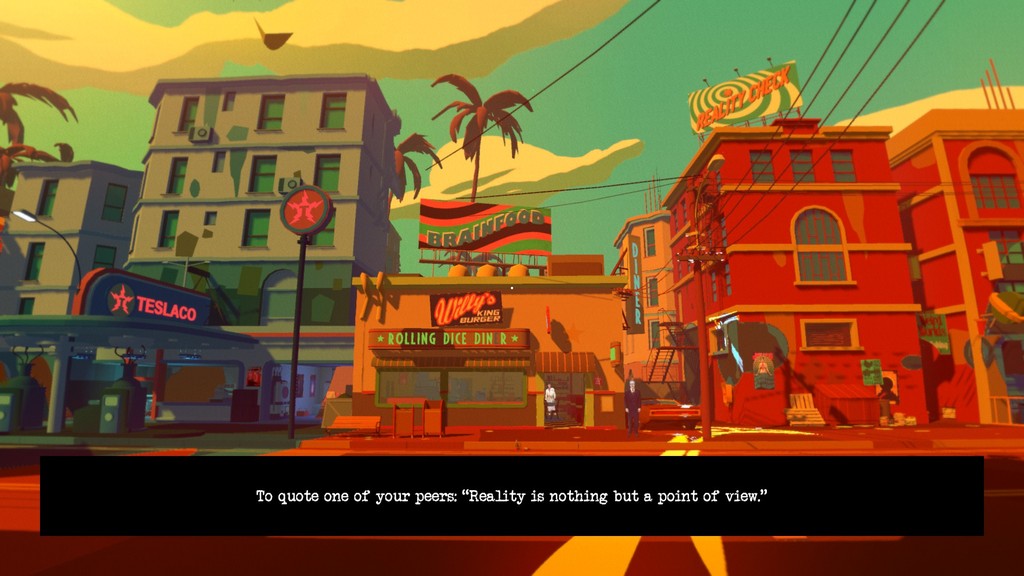
Californium (2016, PC)
Although not technically based on a PKD story, Californium outright states that it “pays homage to sci-fi legend Philip K. Dick by transporting you into the life of a writer who is searching for his own identity”. The whole game is based on the iconic legacy of PKD and so absolutely needs to be included on this list.
Californium is an exploration game with light, hidden-object style puzzles that is heavy on atmosphere; with surreal cartoon-like graphics and an oddly disconcerting low polygon environment. This is one of those games that is more of an experience in interactive art than anything else, but this doesn’t diminish the sense of agency and immersion that you get when playing it nor the desire to explore its depths. There is real gaming joy to be had in finding each new piece of the puzzle and seeing the world shift accordingly.
Given that it’s not technically based on a specific work the PKD rating drops a few notches, however it’s filled with homages and knowing references (including being set in Berkeley; and an Exegesis achievement for finishing the game on March 2nd). It also does a fantastic job of displaying the kind of reality-breaking, paranoid narrative that was threaded throughout PKDs work. As an attempt to capture this core ethos, it does so extremely well and needs to be experienced by any fans of his work.
Essential
PKD rating: 8/10
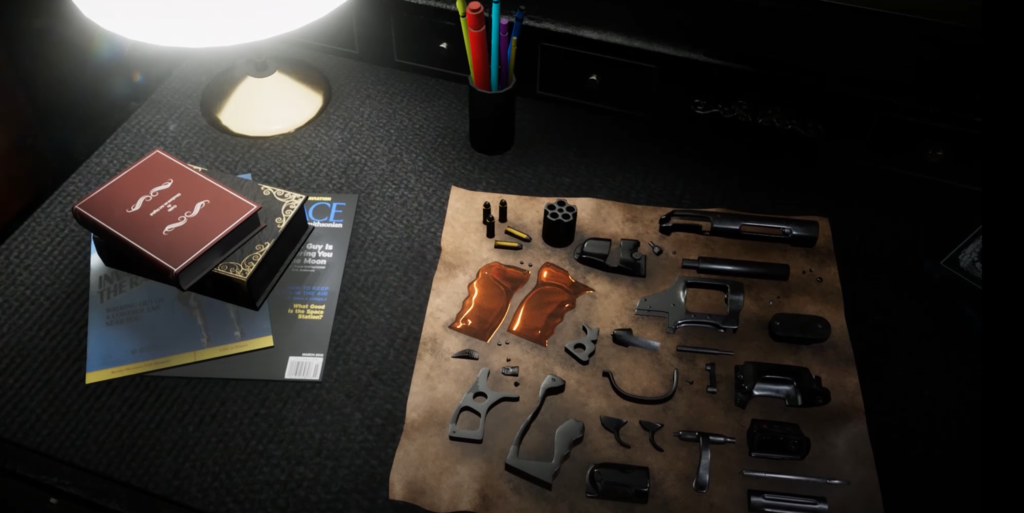
Blade Runner 9732 (2017, VR)
Another example of an adaptation that’s less of a game and more of an immersive PKD experience, Blade Runner 9732 is a recreation of Deckards’ apartment from the original Blade Runner film. It’s a project from a solo developer, that recreates that scene in exquisite detail and was considered a must-see example of the new wave of VR when it was first returning on the back of technological advancements in the medium. There’s no gameplay here, but it’s nonetheless a great experience.
And one that I was glad to have checked out when it was originally released (on an Oculus DK2 that I had, before they sold the tech to Facebook), because in 2018 it got canned through a series of copywrite claims from an overzealous production company (Alcon Entertainment LLC) that must have picked up the Blade Runner rights in 2018 and developed a game for the Google Daydream (see below…); as well as the Nexus/Rogue game for mobile platforms and a new animated series scheduled for 2021.
The 9732 project had received the go ahead from Warner Bros, given that it was a non-commercial VR fan project, but then it seems that a different set of corporate suits stepped in and ruined the fun for everyone. For that reason, alongside the beautiful recreation that the original demo showcased (even if it had some oddly chosen items around the place), it feels authentically PKD as a love letter to the film adaptation and is included here in memory of a great project lost to the ravages of corporate protectionism.
Recommended
PKD Rating: 6/10
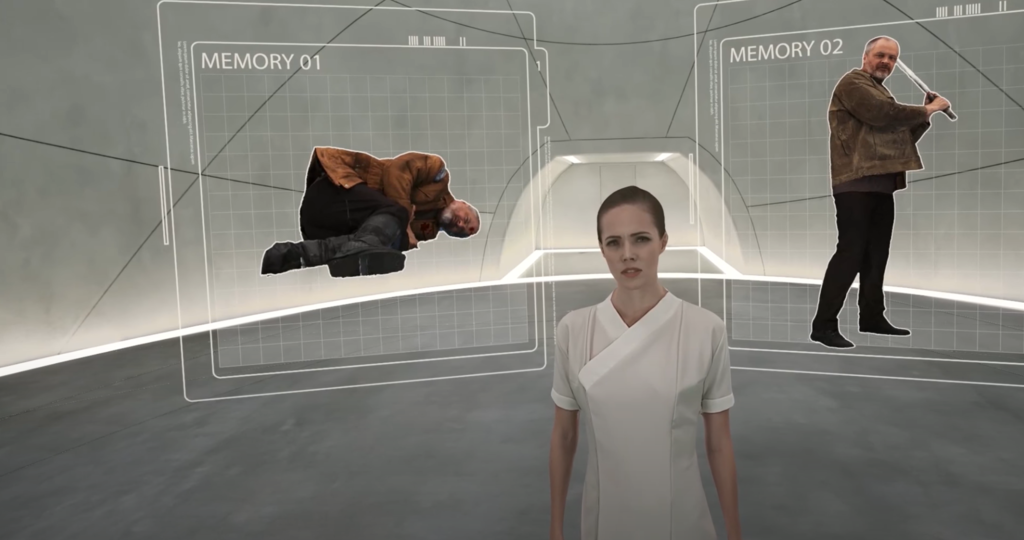
Blade Runner 2049: Memory Lab (2017, Oculus VR)
Memory Lab is another in a series of well-produced and immersive, but relatively short VR experiences that emerged for the release of Blade Runner 2049. The game does a great job of immersing you in the neo-noir dystopian world that the Blade Runner universe envisages and adds some extra depth to areas of the 2049 story, even if the gameplay here is pretty light on the ground and the experience plays more like a series of (beautiful) interactive dioramas.
Being a VR experience, there is a level of freedom involved that makes these kind of adaptations immersive and meaningful above and beyond the gameplay itself. This is a slickly produced and authentic experience, with some truly stunning rendering of human faces that showcases how far VR technology has come. The downside is that it’s exclusive to the Oculus platform, so unfortunately isn’t one I’ve been able to experience myself.
As far as authenticity goes, the gameplay videos show that this is a great adaptation. Again, not one directly based on a PKD novel or short story – but certainly one that takes the world he created with Do Androids Dream of Electric Sheep and wholeheartedly embraces it. It includes all the strangeness of manufactured memories, the paranoia of ambiguous identity and the pitfalls of technology that PKD is well known for. There’s a graffiti nod to Ubik and even a replicant that looks very much like the man himself; which has to get some extra points allotted particularly considering the (in)famous android head that was constructed (and then lost on a plane journey!).
Recommended
PKD Rating: 8/10
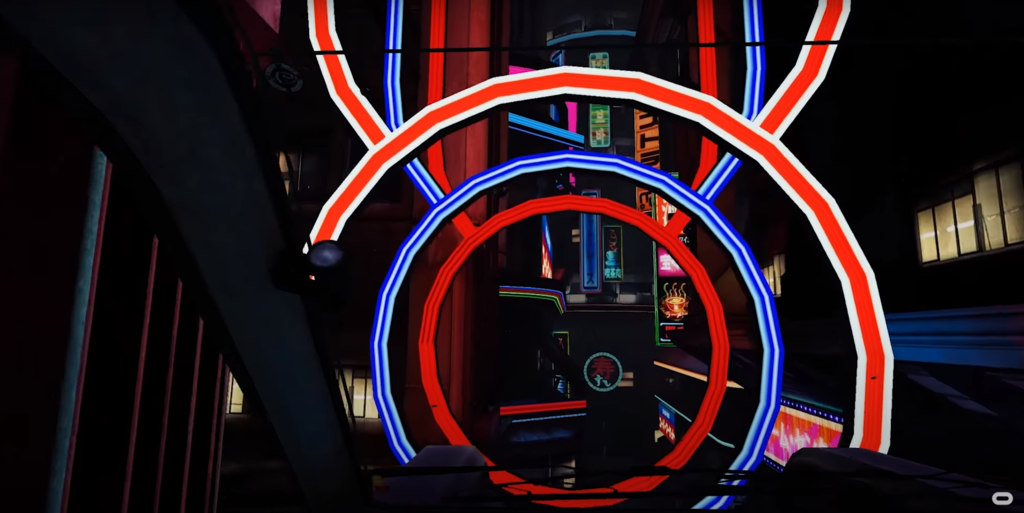
Blade Runner 2049: Replicant Pursuit (2017, Oculus VR)
It is quickly becoming clear that VR is (appropriately) the new platform of choice for developers creating videogame adaptations of PKD’s work. Replicant Pursuit is a good example of how the immersion of VR can provide experiences that everyone has been longing for: this one being to drive a flying car around neon cityscapes.
There are a number of examples available in VR (AirCar being another one for those without access to the Oculus platform), but this seems like one of the better ones. The environments are suitably detailed and help capture that feeling of flying through dystopian cityscapes surrounded by dark, foreboding towers and holographic billboards. Beware the spectre of VR-sickness, though, as games like this are notoriously bad for those who struggle with such things.
There’s not much here beyond the idea that you are chasing ‘replicants’ in flying cars to link it with the work of PKD, but it’s another example of developer’s paying close attention to the extended Blade Runner universe and aesthetic. Given that this aesthetic was so well developed in the original movie and honoured perfectly with the more recent sequel, that’s not a bad thing at all for those of us wanting more videogame adaptations.
Average
PKD Rating: 4/10
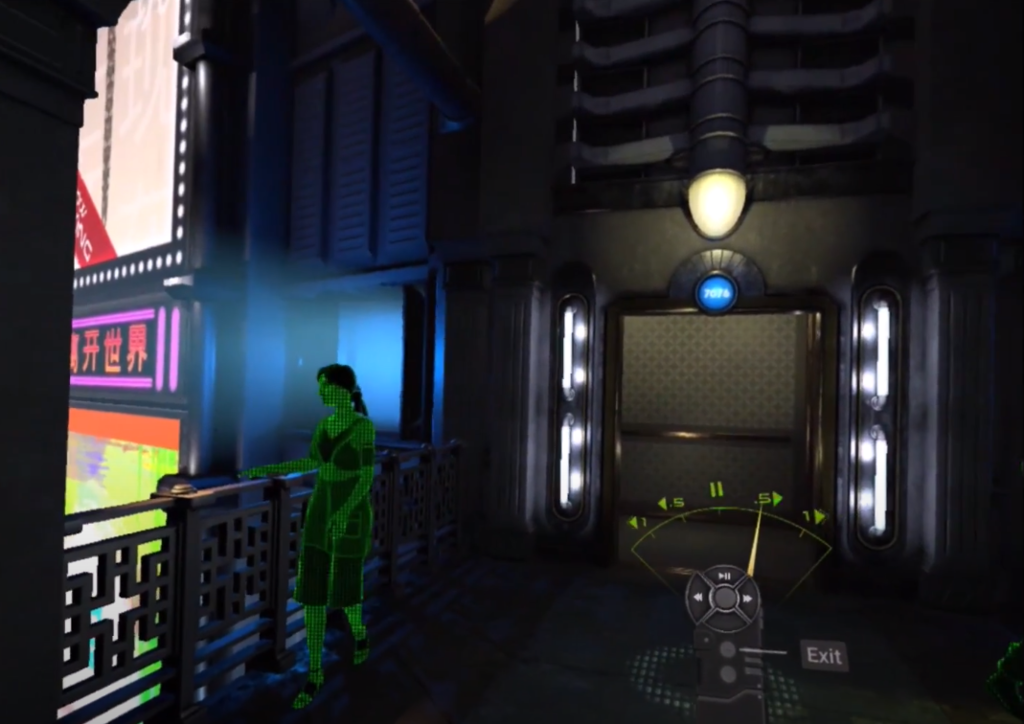
Blade Runner Revelations (2018, Google Daydream)
Alcon Entertainment, that took down the solo development efforts of Blade Runner 9732 as mentioned above, went on to release their own game for the Google Daydream VR platform. It’s a narrative adventure game, with some basic puzzle and action elements, that seems to do a great job of recreating the environments of the Blade Runner film universe.
Unfortunately, the game is let down by the shortcomings of Google’s phone-based VR platform. This is particularly evident in the rendering of characters, but the aliasing of environments is one of the key things that breaks VR immersion as they become distracting to the eye. These shortcomings become even more evident when compared to the amazing renditions shown in something like Memory Lab (see above) released a year earlier, but ultimately they are ones that users of the Google VR platform will be used to and expect.
Full playthrough videos of the game show a relatively detailed narrative experience, with many nods in location design and items around the world that refer back to the Blade Runner film. It’s hard to overlook the copyright legalities that took down a fan project; but putting that aside, this game is a good example of a videogame adaptation of PKD’s work. It’s just a pity that the Google exclusivity means that the game is both significantly hamstrung technologically and also inaccessible for most of us.
Recommended
PKD Rating: 7/10
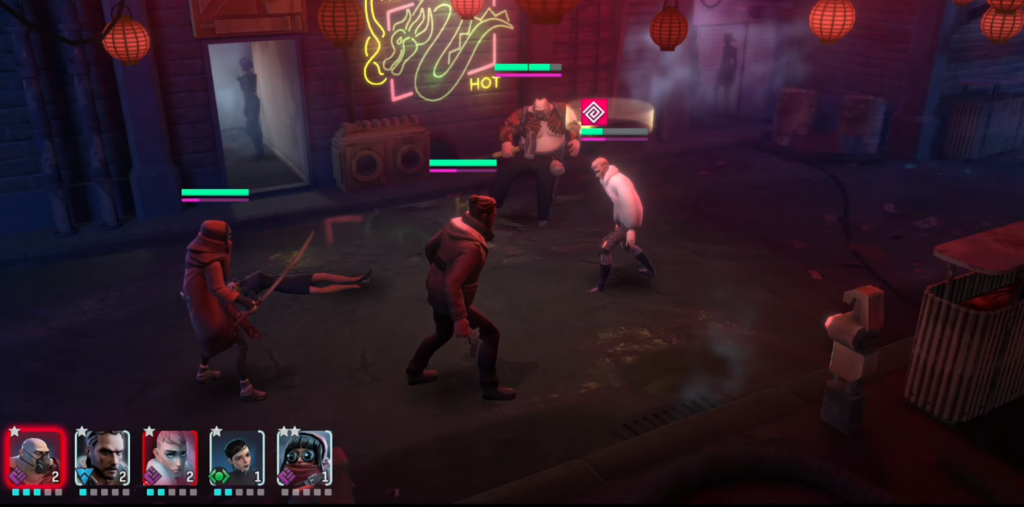
Blade Runner Nexus (2018, iOS / Android)
Also known as Blade Runner Rogue (depending on where you look), Blade Runner Nexus is an interesting tie in to the recent 2049 movie that takes a different approach to any of the other games on this list – being a turn-based tactical combat game with roguelike elements. Another game attached to the license deal given to Alcon Entertainment, it unfortunately isn’t available on the App Store in my location.
The game does seem to do a pretty good job of providing an enjoyable mobile-gaming experience. With crisp, illustrative graphics and tonnes of customisation and possible characters, there’s a level of polish and depth that goes a long way towards making this a highly playable game.
However, from the perspective of this list, it’s another example of one that takes the world as shown in the Blade Runner films only. There’s not really much acknowledgement of PKD’s original source material or wider body of work, it’s once again resting behind a few familiar terms and a generalised cyberpunk look. To be fair, the point of the game is to be set in the Blade Runner universe – so you can’t really fault it for successfully doing that – but it does seem that this is mostly an aesthetic skin over a game that they would have produced anyway, even without the license.
Recommended
PKD Rating: 4/10
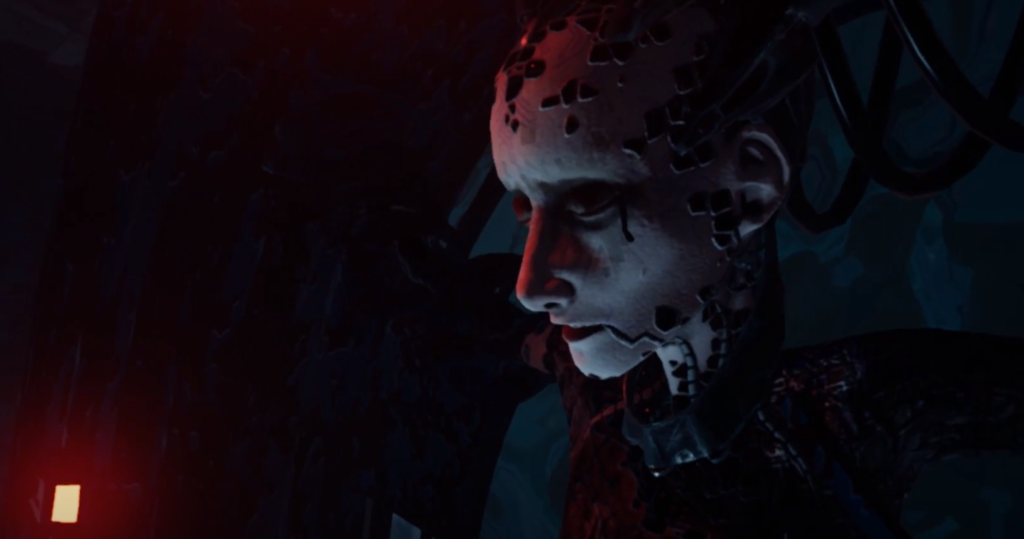
Special Mention: The Great C (2018, VR)
Although this isn’t a videogame, but rather a VR cinematic experience, I’m going to include it here because: a) it’s interactive in the sense that you can direct your viewpoint and framing of the experience; b) it uses 3D-rendered graphics that make it feel more like a game experience than other immersive film projects; and c) it’s awesome to see an adaptation of an obscure PKD short story. The story is not one I had read beforehand, but was pleased to be given the inspiration to do so and then experience this approx. 30min adaptation in VR.
Although there is no gameplay to critique here, the immersive experience is well done and smooth. Because it has been done with 3D animation, you experience a much greater sense of presence than other 360* video experiences and become fully immersed in the story. This is an excellent adaptation of the original story that pays full respect to the legacy of Philip K. Dick. It explores some of his more interesting, but lesser known, low-tech/sci-fi hybrids that he has a number of excellent examples of (such as Dr Bloodmoney). What’s particularly interesting, given that it’s one of his earlier works (published in 1953), is that it has shadows of his later VALIS work and techgnostic theology that seem to stretch back through time.
It’s fantastic to see new examples of developers and interactive filmmakers interested in adapting his work, so make sure to check it out if you can…even if it’s not technically a videogame.
Recommended
PKD Rating: 10/10
Conclusion
Going into researching this piece I expected to find a few more obscure titles from past decades, but was surprised to see there was relatively little out there (I even stumbled across an 8-bit recreation that unfortunately wasn’t a real game). However, it’s encouraging to see that new adaptations of PKD’s work are closely linked to the source material.
I’m certain that this list will continue to grow, as there are still so many avenues for videogames to explore the different worlds and paranoid realities that PKD created throughout the vast body of his work. As an aside, there are also a small number of boardgame adaptations based around, you guessed it, the Blade Runner universe – including one released in 1982 for the original film that is nicely technicolour – as well as some more immersive film experiences to be found out there.
VR seems particularly ripe for adaptations, as it is not only a deeply immersive medium but is also one that allows players to experience the sense of scale that many of the futuristic, apocalyptic and cosmic environments that PKD’s work present. There’s also scope for adventure games centred around exploration and characterisation (rather than combat). The increasingly popular genre of visual novels seems like another obvious choice and relatively straight-forward to develop compared to other more complex videogame genres.
The full extent of the meaning and depth of PKD’s body of work has yet to be fully explored, even though he is one of the most adapted authors out there. The multitude of explorations throughout all forms of media – from fiction and film through to comic books, videogames and academic analysis – has given a glimpse into how rich and resonant the worlds of PKD are, but there are few examples that have really captured the essence of his work.
Videogames are particularly well suited to achieve this, perhaps better than any other form, and so we can only hope that more developers will take the plunge and commit themselves to the challenge of adapting PKD and allowing us to experience the realities he envisaged so well.
If you know of any games that are in development, or ones that I’ve missed, please do let me know so they can be included here!

